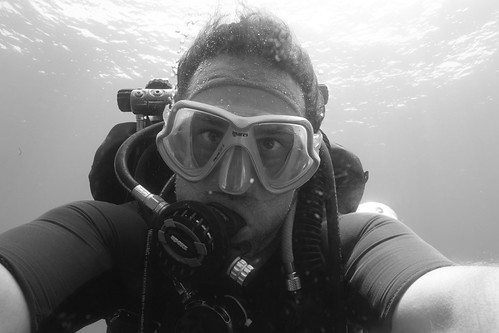Tec Instructor!
As of today I am an instructor for technical diving! Yeah!
What is technical diving? It’s diving more challenging than the usual “recreational diving”. Tec divers need more training, more equipment and more planning to do their dives. We usually go deeper, and we include planned & mandatory decompression stops in our dives. Any serious penetration of a wreck or cave is also a tech dive. I am now certified to teach the PADI tec 40, tec 45 and tec 50 courses, which will enable the students to do tec dives to 40, 45 and 50 meters. Of course I’ll teach out of my new diving home, the Submariner Diving Center in El Nido, Palawan.
A big salamat (thank you) to Abraham Borg, Matt Reed and Lee Butler who put me on the path to tec diving, and instructing tec diving!
The difference between recreational and tec diving is comparable to the difference between a nice hike through an alpine valley (which can be undertaken any day with nice weather by anyone moderately fit) and a mountaineering expedition into the Himalayas (which needs much more planning, skills & gear). While recreational divers usually bring one tank, tec divers carry up to 5 of them. The tanks usually contain different breathing gases: for the ascent, we use mixes with higher oxygen content than air, to speed up decompression. A lot of the gear in tec diving is also redundant, so, for instance, if a mask strap rips we have a second mask to be able to continue the dive.
So, why tech dive at all? Why go to 50 meters? The mountaineering legend George Mallory replied to the question “Why did you want to climb Mount Everest?” with the answer “Because it’s there”. I agree with the notion! There are reefs deeper than the recreational diving limit of 40 meters, and I want to dive them. There are also animals only seen at deeper depths; and many ship wrecks inconveniently sank at spots deeper than 40 meters.
Tec diving is a good challenge. There is a lot of satisfaction in completing a tec dive the right way, as planned. Properly done, it’s a safe sport. Not as safe as gaming & eating pizza on your couch, but much, much, much safer than diving to 50 meters with a single tank and no real planning (as some old timers still foolishly do)! In the long run, it’s actually safer than gaming & eating pizza on your couch, because you might one day die realizing that all you did with your life was gaming & eating pizza on your couch, and you missed the opportunity to dive & tec dive!
When at deeper depths, I am overcome by a sense of calm euphoria. I see reefs which are unaffected by coral bleaching and un-trampled by divers with sucky buoyancy. I see fishes which are restricted to deeper depths, especially gobies and anthiases (the latter seem to be especially species-rich at depth). I feel privileged to see these parts of Planet Earth. The exaltation is real, I think … and also partially caused by nitrogen narcosis, an effect of high ambient pressure on the human nervous system!
It’s important to understand this narcosis and all the other changes to your body when tec diving. My background in zoology/physiology comes in handy when teaching about these changes. To me, the physiological changes when breathing air at high pressures are both necessary to understand when diving deep, and fascinating to ponder for the sake of the knowledge itself.
Summary: tec diving is awesome. I’m serious! Do it!



